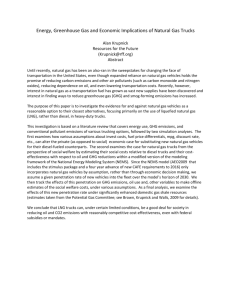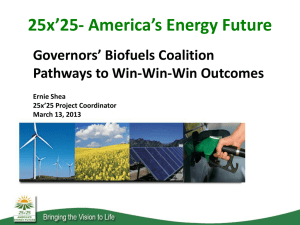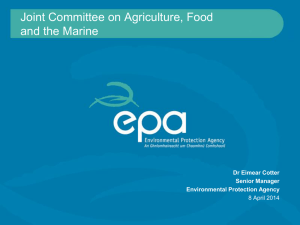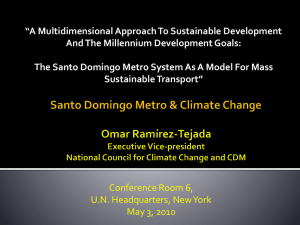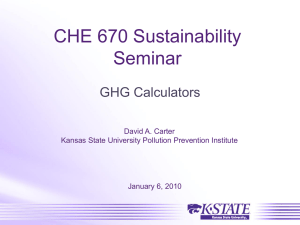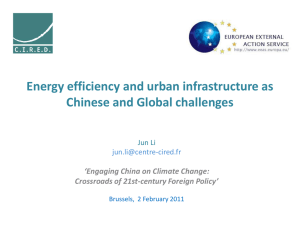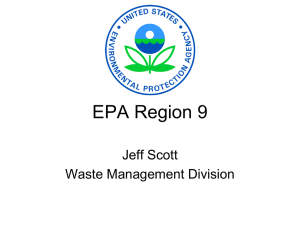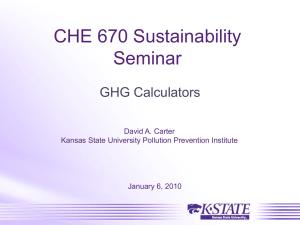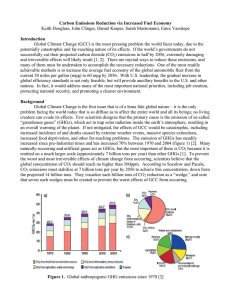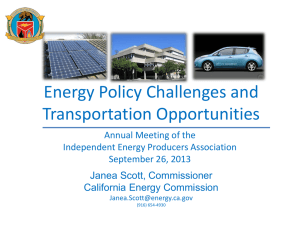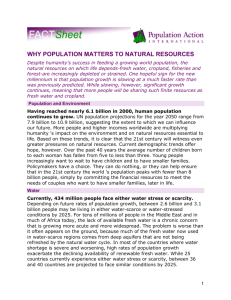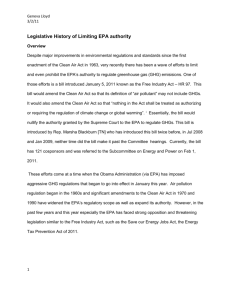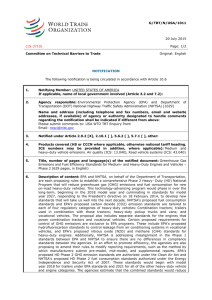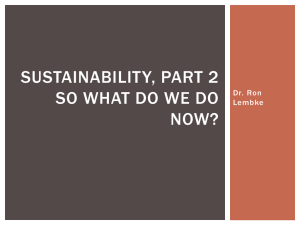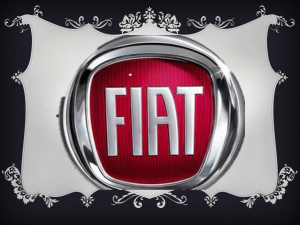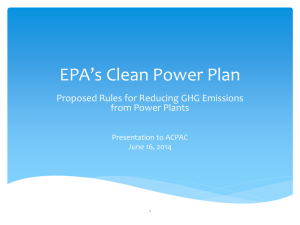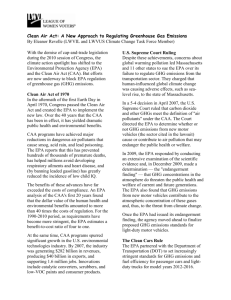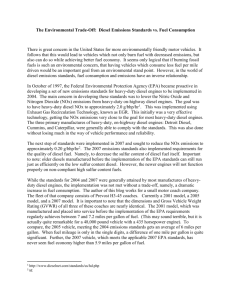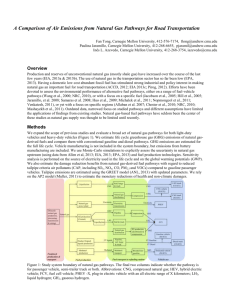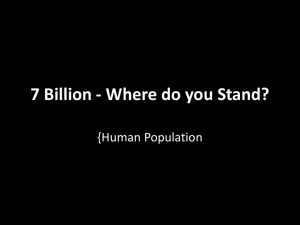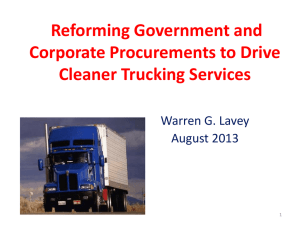Julie Becker - State of New Jersey
advertisement
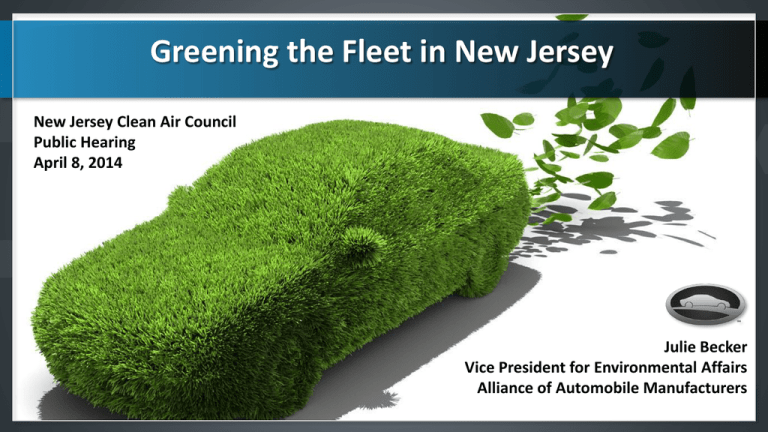
Greening the Fleet in New Jersey New Jersey Clean Air Council Public Hearing April 8, 2014 Julie Becker Vice President for Environmental Affairs Alliance of Automobile Manufacturers Question: What’s New in New Jersey? Answer: Not the Light-Duty Fleet! The average car on the road in NJ today is 11.4 years old. “The Virtuous Cycle”: replacing a road warrior makes a profound difference for the environment and passenger safety. Environmental improvements are taking place across all powertains. The 2013 Model Year Included… 535 Models That Achieve 30 MPG or Higher Highway Fuel Economy A Wide Range of Powertrains 60 models of hybrids 7 models of PHEVs 2014 Ford Focus Electric 10 models of BEVs 34 models of diesels Source: fueleconomy.gov Fuel Economy is Improving Source: EPA Trends Report Advances in Conventional Technologies are Driving Fuel Economy/GHG Improvements • • • • • • • • • • • • Cylinder deactivation • Variable valve timing • Stratified charge combustion • Controlled auto-ignition • Homogeneous charge compression ignition • Low rolling resistance tires • Lean-burn gasoline engines • Clean diesel selective catalytic reduction • Stop-Start • Lightweight materials Reduced GWP refrigerants, improved A/C efficiency and low-leak A/C systems 7, 8 and 9-speed transmissions Advanced ceramics for trapping clean diesel emissions Integrated starter alternator damper Belt-driven alternator starter Adaptive cruise control Advanced aerodynamics Driver fuel consumption feedback systems Continuously variable transmissions Tire pressure monitoring Downsized turbocharged engines Auto Sector R&D Amount Spent Annually on R&D in 2013 $ Billions 100 80 60 40 $102 Billion 20 99% Comes from the Auto Industry! $25.5 Billion 0 Autos Aerospace & Defense Projected U.S. NOx Emissions Under Tier 2 Source: U.S. EPA Alliance Supports EPA’s Final Tier 3 Rule By 2025, Light-Duty Vehicles Must Have: 80% Lower Nitrogen Oxide (presented as NMOG+NOx) Emissions 70% Lower Particulate Matter (PM) Emissions 150,000 Mile “Useful Life” for Emission Control Systems By 2017, Gasoline Producers Are Required to Meet an Annual Average Standard of 10 Parts Per Million (ppm) Sulfur Immediately Achieves 10% Lower NOx from On-Highway Vehicles Enables Fuel-Efficient Technologies 2012-2025 GHG Goal Expressed in Miles Per Gallon 55 50 MPG 45 40 35 30 25 The endpoint of 54.5 represents the goal of 163 gpm CO2 emissions from improved fuel economy and credits for other measures that reduce GHG emissions. EPA Chief Gives Automakers 'A' for Fuel Economy Effort "If we don't quite get there … it is not going to be the fault of those companies... They are trying hard. They are working. They are investing." Gina McCarthy EPA Administrator January 13, 2014 News from the 2014 Auto Shows Cadillac ELR (Extended Range Electric) with “Regeneration on Demand” puts energy back into your battery while simultaneously slowing you down. Photo Source: www.cadillac.com VW Passat BlueMotion Concept Car: 7 speeds, direct injection, turbo, stop-start, cylinder deactivation and more! Photo source: www.press.bmwgroup.com Photo source: www.vw.com The BMW i3 is the world’s first vehicle to use carbon fiber on this scale in large volume production. Its range extender version uses a small gasoline engine to recharge the battery. More News from the Auto Shows 2015 F-150 sheds 700 pounds with aluminum body and cargo box Photo Source: Ford Motor 2014 Dodge Ram 1500 EcoDiesel Pickup, rated 28 mpg highway, features a 3.0 liter V6 engine Photo Source: www.newsday.com Why Is Every Company Doing Something Different? The GHG/CAFE program is a consumption program, not a production program, and each company’s customer base is unique. “Looking ahead, about 5% of projected MY 2013 production could meet the MY 2025 CO2 emissions targets. Vehicles meeting the MY 2025 CO2 targets are comprised solely of hybrids, plug-in hybrids, and electric vehicles. Since the MY 2025 standards are over a decade away, there’s considerable time for continued improvements in gasoline vehicle technology.” EPA Trends Report, Oct. 2013 NJ Versus CA CA Issue • ZEV Incentives Public Fueling Infrastructure (Source: DOE Alt Fuels Data Center, www.afdc.energy.gov, 3/25/14) • • • • • State rebates • BEVs: $2,500 rebate • PHEVs: $1,500 rebate HOV access (1,400 miles) Local rebates up to $3,000 Local free parking Free charging Utility discounts EV chargers: 1,651 Hydrogen: 9 stations 18 more funded CNG: 143 stations NJ • • • Sales & use tax exemption HOV access (<50 miles) Green Pass (10%) Discount on Off-Peak NJ and Garden State Turnpike Fees for SULEV Vehicles with ≥ 45 MPG EV chargers: 88 Hydrogen: 0 stations CNG: 27 stations ZEV Sales Need to Meet the Future Mandated Requirements Vehicle Type 2013 Sales 2020 Requirement 2025 Requirement BEV 843 26,918 71,782 PHEV 1,677 <0.5% 28,040 6% 48,068 15.4% To meet the 2020 requirements, New Jersey consumers will need to purchase ZEVs at 12 times the present rate. To meet the 2025 requirements, New Jersey consumers will need to purchase ZEVs at >30 times the present rate. Getting Green Vehicles from the Showroom to the Driveway Is Complex and Challenging! THANK YOU!
